Dec 21, 2025
Dec 21, 2025
The extraordinary feat of rescue of the 33 Chilean miners trapped 2,000 feet underground for 70 days will be ranked one of the most inspiring events in modern memory. The rescue began at midnight on Tuesday, 12th October, 2010 when the metal capsule Phoenix 2 pod was lowered to where 700,000 tons of rock had collapsed on August 5 entombing the miners. The mission was certainly an unqualified success, both from technology and leadership angles. I am more enchanted by the leadership and command-and-control strategies one could witness during the unfolding of this human drama. I did considerable reading of various newspapers and articles and what I have presented below is a summary of the leadership episodes that emerged from the beginning of the tragedy to its miraculous finale.
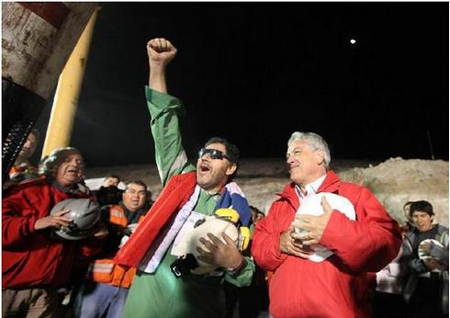
Luis Urzua (in green) with President of Chile standing on his left
| There is no rocket science to leadership. Leadership is a collection of seemingly minor things that, taken as a whole, create a climate in which people feel honoured and valued. |
It was Napoleon who said, "A leader is a dealer in hope". Right from the beginning, the Chilean President Sebastian Pinera shared this hope in no uncertain terms. The president was not a mere spectator. He was in the thick of everything and his visibility was simply amazing (Compare it with the importance our Indian counterparts give to such tragedies). If perpetual enthusiasm is a force multiplier, this was evident in the missionary zeal with which the technical and leadership teams worked together to ensure synergy at every step.
Instilling Courage
When audio contact was first made with foreman Luis Urzua after 17 days of search , the first words he uttered was, "Shift foreman speaking," a true professional voice even in times of extreme crisis. The 54-year-old took charge of the situation, distributing food and allocating jobs to keep the men busy. That voice, "Shift foreman speaking" will be remembered as one of the greatest leadership quotes in recent times. The most miraculous part of the story is not the rescue. The real miracle — and most inspiring part of this story — is how shift boss Luis Urzua managed to overcome darkness, despair and the prospect of starvation to mobilize a team, who worked together to ensure that every man survived and thrived in the worst of conditions. He had a reputation among employees and one said - “He is very protective of his people and obviously loves them.” This reputation had to be pivotal when he needed to convince 32 other hungry miners, many of whom thought they’d be rescued within days, to ration two-day worth of supplies to last the 17 full days before they were discovered. The miners, at Urzua’s urging, reportedly ate one teaspoon of tuna and a half-glass of milk each 48 hours. True leaders like Luis Urzua follow heart and soul, even in circumstances that seem impossible and hopeless.
Teamwork
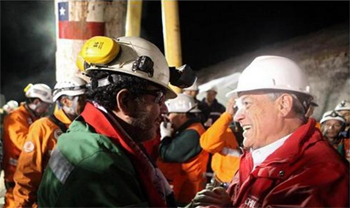 Everyone wants to survive. In crisis, it’s tough to keep people focused on the team rather than themselves. One of the techniques Urzua used to remind the miners that they were in this together was to have everyone eat their paltry rations in the same spot at the same time. Knowing that there could be no cheating, that no one had more than another, had to help obviate the natural tendency to break away from the team into a every-man-for-himself mentality that would have sunk them all. By the end, the miners were so bonded that they asked rescuers if they could all remain on the site until the last man was brought to the surface. Not surprisingly, Urzua was that last man.
Everyone wants to survive. In crisis, it’s tough to keep people focused on the team rather than themselves. One of the techniques Urzua used to remind the miners that they were in this together was to have everyone eat their paltry rations in the same spot at the same time. Knowing that there could be no cheating, that no one had more than another, had to help obviate the natural tendency to break away from the team into a every-man-for-himself mentality that would have sunk them all. By the end, the miners were so bonded that they asked rescuers if they could all remain on the site until the last man was brought to the surface. Not surprisingly, Urzua was that last man.
Discipline
Every miner had a job. One became the religious leader; others helped map their tunnel to see the potential ways out. Urzua organized work shifts, giving each miner responsibilities that kept them busy, improved their living conditions and emphasized that individual’s importance to the the team. They maintained a schedule, shining lights to simulate day and night. They also maintained a strict diet even after they were delivered food. They were focused on a goal — getting out. They needed to be disciplined to keep their living conditions acceptable and keep their waistlines in check to be lifted to safety.
Strategy and Goal-oriented Focus
The power of plying with a purpose was the most visible leadership lesson in the whole episode. The Chilean rescue was truly a multinational and multidisciplinary affair, with contributions from a variety of companies and institutions around the world. The rescue capsule was designed by an Austrian firm. Experts from NASA and other American agencies helped to sustain the 33 miners underground, and an American company from Pennsylvania supplied the drills that bored through half-a-mile of rock. Geologists, psychologists, and other experts from several different countries offered advice while the Chilean government, under mining minister Laurence Golborne, remained firmly in control.
This might sound a facile task. One should but it's extraordinarily difficult to assemble resources from dozens of providers while preventing turf battles from bogging down the whole effort. Not-invented-here syndrome is a universal danger to any multilateral effort, since people in charge always prefer their own solutions to those offered by somebody else, especially when national pride is at stake. Military and law-enforcement officials routinely face this problem when operations cross jurisdictions or involve units under different commands. Corporations often struggle to get agreement between department heads, even on the smallest matters. In the pursuit of a singular goal—rescuing the miners—the Chileans have shown focus and discipline that ought to humble so-called leaders the world over.
Under-promise and Over-deliver
"Under-promise and over-deliver" is a popular quote by business guru Tom Peters. Yet, this is what Chilean authorities did. This may be an old cliché, yet leaders at every level routinely ignore it by creating unrealistic expectations that leave people disappointed. The Chileans did the opposite. In early August, when the mine first collapsed and the fate of the miners was unknown, Chilean Mining Minister Laurence Golborne said there was a slim chance they'd be found alive. That brought criticism, but it also set the stage for a tragic outcome while still leaving room for hope. Then, when the miners were found alive, Chilean officials cautioned that it could take as long as four months to reach them. That might have come from naiveté or lack of familiarity with state-of-the-art drilling equipment, but now that the miners have been rescued ahead of schedule, everybody awaiting the rescue feels relief rather than anger. And the Chilean government looks competent instead of ham-handed, which would have been the case if they had to backpedal from an overoptimistic timeline.
Compare that to the BP oil spill in the Gulf of Mexico and low-ball estimates of the amount of oil spilled, which were continually revised upward by huge amounts, trashing BP's credibility.
Have Backup Plans
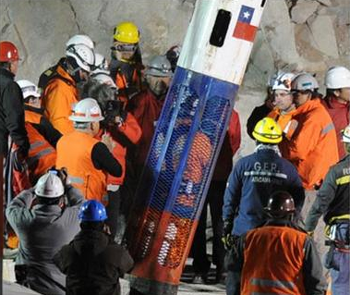 Yet another leadership trait is the virtue of laying backup plans. The shaft that ultimately reached the miners was the second of the three being drilled, and the only one using innovative air-powered drills that turned out to be ideal for the type of rock in the area. Since miners had never been rescued before through such a long shaft, the rescue operation was basically an intense experiment. Trying several different things at once obviously raised the odds of success. That can be hard to do in more mundane situations where nobody's life is at stake and funding is tight, but it's always worth keeping in mind that there might be more than one way to succeed—and that your first idea about how to do it could be wrong.
Yet another leadership trait is the virtue of laying backup plans. The shaft that ultimately reached the miners was the second of the three being drilled, and the only one using innovative air-powered drills that turned out to be ideal for the type of rock in the area. Since miners had never been rescued before through such a long shaft, the rescue operation was basically an intense experiment. Trying several different things at once obviously raised the odds of success. That can be hard to do in more mundane situations where nobody's life is at stake and funding is tight, but it's always worth keeping in mind that there might be more than one way to succeed—and that your first idea about how to do it could be wrong.
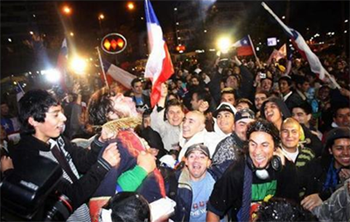 Shared Credit
Shared Credit
When it came time to speak to people at the surface, Urzua stepped aside, preferring to have another miner narrate a video requested by health officials.
While miners in and out of the shaft talked about Urzua’s leadership, Urzua talked about the skills and welfare of his men.
Marching with a Single Heartbeat
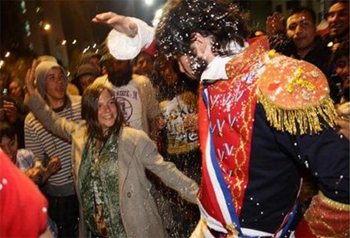 Finally what everyone witnessed was the joy of team pride. It was gratifying to see the Chileans come together and win one for the home team. In an era of corporate bloodletting, political warfare, and generally low morale, the Chilean rescue is a reminder that people really can work together to accomplish something.
Finally what everyone witnessed was the joy of team pride. It was gratifying to see the Chileans come together and win one for the home team. In an era of corporate bloodletting, political warfare, and generally low morale, the Chilean rescue is a reminder that people really can work together to accomplish something.
There is no rocket science to leadership. Leadership is a collection of seemingly minor things that, taken as a whole, create a climate in which people feel honoured and valued.
The Chilean Miners rescue will be remembered for long time as a glorious leadership exercise in the history of human endeavour where every team member felt valued and honoured.
Reference:
Articles on Leadership experiences from Chilean Mine Rescue by Rick Newman and Kathy Kristof
Images courtesy: La Hora
16-Oct-2010
More by : P. G. R. Nair

|
A wonderful description with appropriate analysis. Kudos to PGR Nair. |